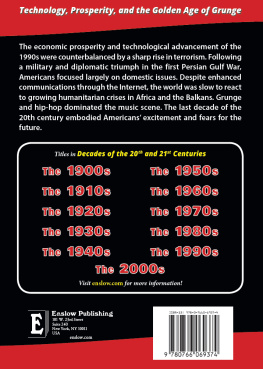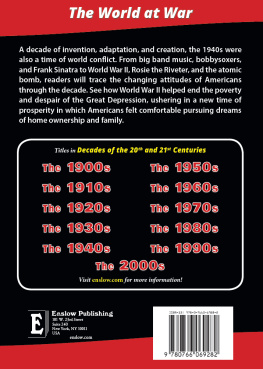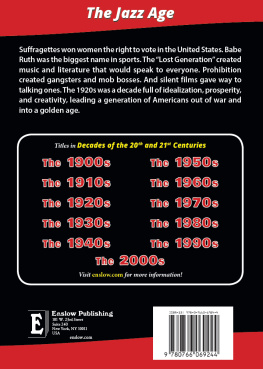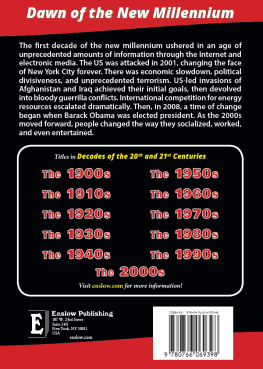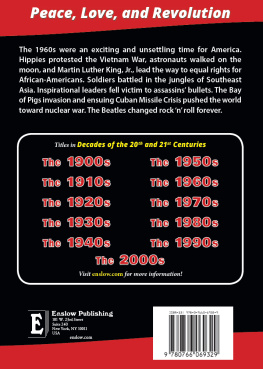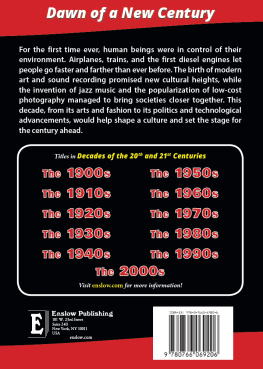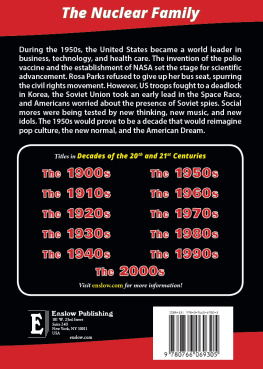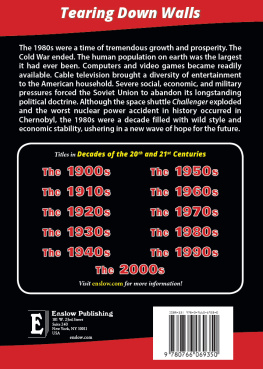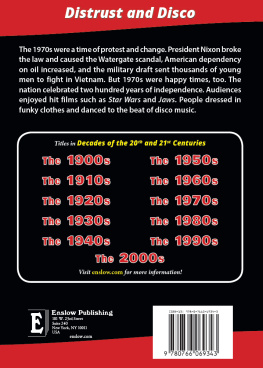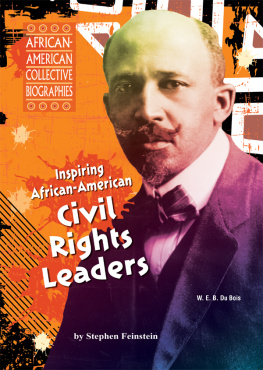Stephen Feinstein - The 1990s
Here you can read online Stephen Feinstein - The 1990s full text of the book (entire story) in english for free. Download pdf and epub, get meaning, cover and reviews about this ebook. publisher: Enslow Publishing, genre: Politics. Description of the work, (preface) as well as reviews are available. Best literature library LitArk.com created for fans of good reading and offers a wide selection of genres:
Romance novel
Science fiction
Adventure
Detective
Science
History
Home and family
Prose
Art
Politics
Computer
Non-fiction
Religion
Business
Children
Humor
Choose a favorite category and find really read worthwhile books. Enjoy immersion in the world of imagination, feel the emotions of the characters or learn something new for yourself, make an fascinating discovery.
- Book:The 1990s
- Author:
- Publisher:Enslow Publishing
- Genre:
- Rating:5 / 5
- Favourites:Add to favourites
- Your mark:
- 100
- 1
- 2
- 3
- 4
- 5
The 1990s: summary, description and annotation
We offer to read an annotation, description, summary or preface (depends on what the author of the book "The 1990s" wrote himself). If you haven't found the necessary information about the book — write in the comments, we will try to find it.
The 1990s — read online for free the complete book (whole text) full work
Below is the text of the book, divided by pages. System saving the place of the last page read, allows you to conveniently read the book "The 1990s" online for free, without having to search again every time where you left off. Put a bookmark, and you can go to the page where you finished reading at any time.
Font size:
Interval:
Bookmark:


Published in 2016 by Enslow Publishing, LLC.
101 W. 23rd Street, Suite 240, New York, NY 10011
Copyright 2016 by Enslow Publishing, LLC.
All rights reserved.
No part of this book may be reproduced by any means without the written permission of the publisher.
Library of Congress Cataloging-in-Publication Data
Feinstein, Stephen.
The 1990s / Stephen Feinstein.
pages cm. (Decades of the 20th and 21st centuries)
Includes bibliographical references and index.
Summary: Discusses the decade 1990-1999 in the United States in terms of culture, art, science, and politics Provided by publisher.
Audience: Grade 9 to 12.
ISBN 978-0-7660-6937-4
1. United StatesCivilization1945- Juvenile literature. 2. United StatesPolitics and government1989-1993Juvenile literature. 3. United StatesPolitics and government1993-2001Juvenile literature. 4. Nineteen eightiesJuvenile literature. I. Title.
E169.12.F4476 2015
973.929dc23
2015011322
Printed in the United States of America
To Our Readers: We have done our best to make sure all Web sites in this book were active and appropriate when we went to press. However, the author and the publisher have no control over and assume no liability for the material available on those Web sites or on any Web sites they may link to. Any comments or suggestions can be sent by e-mail to .
Photo Credits: 7831/Gamma-Rapho via Getty Images, p..
Cover Credits: Georges MERILLON/Gamma-Rapho/Gamma-Keystone via Getty Images (Nelson Mandela); Jayne Fincher/Princess Diana Archive/Hulton Royals Collection/Getty Images (Diana); Ken Jarecke/ Department Of Defense (DOD)/The LIFE Picture Collection/Getty Images (soldiers); Richard Ellis/Hulton Archive/Getty Images (Bill and Hillary Clinton).
Contents
Introduction
Pop Culture, Lifestyles, and Fashion
Entertainment and the Arts
Sports
National and International Politics
Advances in Science, Technology, and Medicine
Conclusion
Timeline
Glossary
Further Reading
Index

The development of the Internet radically changed society.
Introduction
The 1990s began on an optimistic note. The Berlin Wall had just been torn down late in 1989, which brought a symbolic end to the forty-five-year-long Cold War between the United States and the Soviet Union. After the fall of the wall, the communist governments of Eastern Europe fell, too, one by one. In 1991, the Soviet Union itself collapsed. Russians then began the difficult process of changing their nation into a democratic society. Now that the Cold War was over, Americans could look forward to peace. But the world would not be a peaceful place in the 1990s. The United States would take on the task of policing the world as the only superpower.
In spite of these problems, the 1990s proved to be a period of prosperity for many Americans. The United States had its greatest boom economy in postWorld War II history. Perhaps the biggest changes in the economy and society came about through the development of the Internet.
This global computer network quickly became part of everyday life. E-mail, web browsers, and search engines were powerful new tools. They made it easy to find information and talk with others. Students did research online. Shoppers bought items from home instead of going to a store. People could make new friends in faraway places. The Internet changed society.
New technology could not solve all of the worlds problems, however. In some cases, it added to them. The Internet enabled thieves to commit crimes online. People debated the potential risks of cloning animals. As the decade closed, people worried that a potential computer glitch called Y2K might bring disaster to our technology-driven society.
By the 1990s, computers were the gateway to important new discoveries. With computers, scientists studied the blueprints of life. They began the Human Genome Project in 1990. This was a massive effort to learn how the human body grows and develops. A few years later, scientists discovered a way to clone animals. They made an exact copy of a sheep. New technology also aided the study of space. In 1990, the Hubble Space Telescope was launched into orbit. It offered amazing views of the universe. In 1997, a tiny rover roamed the surface of Mars. It sent back stunning images of the Red Planet.
Some of humanitys most ancient problems also remained. Medicine had made great strides, but fatal illnesses still existed. The deadly disease HIV/AIDS ravaged Africa during the 1990s. Conflicts still plagued the world, as well. In the Middle East, Iraq invaded Kuwait during the summer of 1990. Troops from across the globe united to free the tiny kingdom in early 1991. Later in the decade, a new group of terrorists gained strength. Their organization, known as al-Qaeda, began a war of terror against the United States and its allies.
Foreign terrorists were not the only threat. In 1995, a US citizen blew up a government building in Oklahoma. Four years later, two high school students went on a deadly rampage in Colorado. They killed thirteen classmates and teachers before taking their own lives. Even larger massacres were taking place in other parts of the world. In Bosnia and Rwanda, enormous groups of people were killed because of ethnic differences.
As the final decade of the twentieth century ended, people looked to the future. Technology promised more great discoveries, yet it also promised more challenges. It rushed the pace of life. It made families and friends more isolated from each other. The 1990s showed that technology had benefits and drawbacks.
Pop Culture, Lifestyles, and Fashion
Today it is hard to imagine life without the Internet. The vast network connects computers from all across the globe. We use it for work, for entertainment, and to talk with others. Yet the Internet is a relatively new invention. It only became widely available in the mid-1990s.
The Rise of the Internet
During the 1990s, the Internet brought a whole new world right to peoples fingertips. It was the world of cyberspace, which was often called the information superhighway. In an instant, anyone with access to a computer, modem, and telephone line could connect to huge databases anywhere in the world. With a few simple clicks of a mouse, powerful search engines would retrieve information from the World Wide Web. Scientists and engineers worked constantly to find ways to make information pass faster over the Internet.
Online, a person could read magazines, news articles, encyclopedia entries, even entire books. Such information was available at any time day or night. Before long, some people felt they were drowning in information.
Of course, having so much information available did not necessarily mean it was all accurate or good. Easy access to the Internet meant that almost anyoneeven those with faulty information or dangerous motivescould post sites for the public to view.
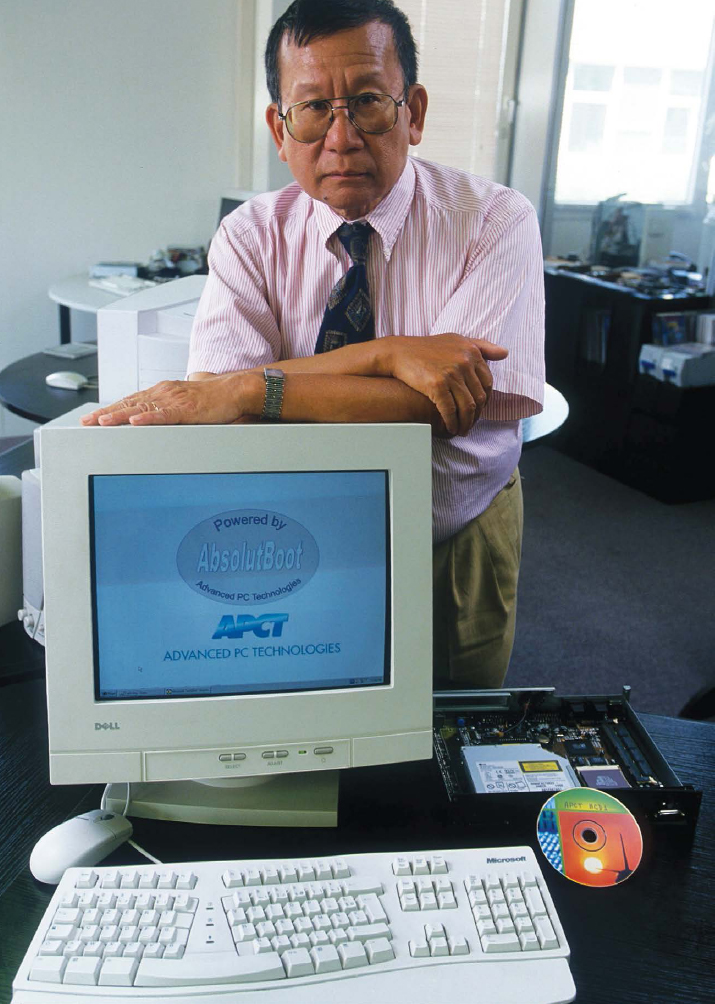
Communication became much easier and faster thanks to the Internet.
Font size:
Interval:
Bookmark:
Similar books «The 1990s»
Look at similar books to The 1990s. We have selected literature similar in name and meaning in the hope of providing readers with more options to find new, interesting, not yet read works.
Discussion, reviews of the book The 1990s and just readers' own opinions. Leave your comments, write what you think about the work, its meaning or the main characters. Specify what exactly you liked and what you didn't like, and why you think so.

